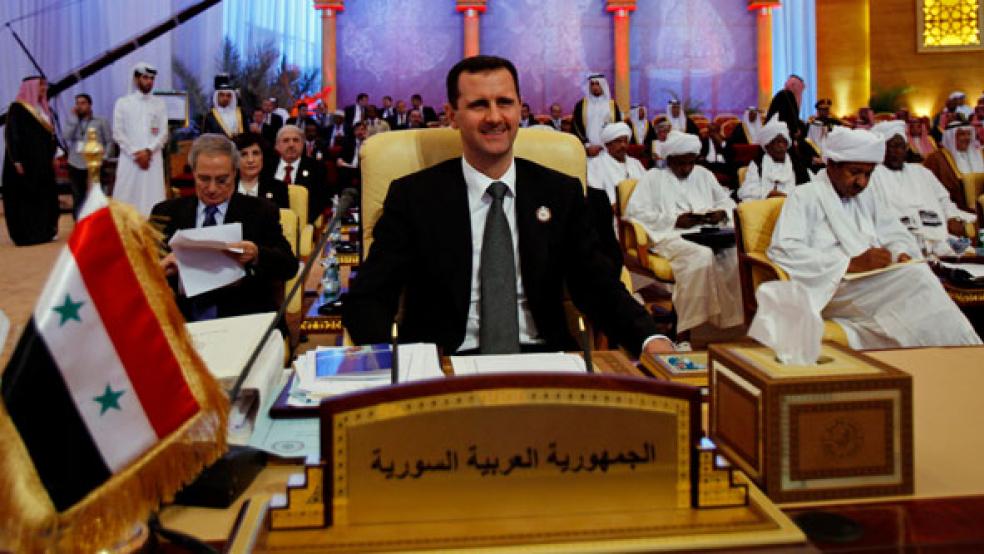Yesterday in Geneva, the opposing sides of the Syrian civil war shared a moment of silence to honor the victims of the three-year conflict. Unfortunately, that moment was just about all the sides could agree on in negotiations held over the last week.
The only other thing both sides agreed on is a document framing discussion going forward. Progress toward substantive steps to stop the war is at a standstill. The split was over how the country should be run: advisers to President Bashar al Assad have refused to consider a transitional government favored by the opposition.
Related: Obama's Red Line in Syria Was Drawn in Pencil
This impasse prompted U.N. mediator Lakhdar Brahimi to say the gap between the sides is “quite large.” In an interview with the Associated Press, Assad adviser Bouthaina Shaaban said that this gap would not be closed.
“To be blunt, I do not expect that we're going achieve anything substantial,” he said Tuesday.
Thursday brought more animosity, with Deputy Foreign Minister Faisal Mekdad accusing rebels of terrorism.
“We presented a proposal that the two sides might agree on the importance of combating violence and terrorism. The other side rejected it because they are involved in the issue of terrorism,
Related: Obama Gives Syrian Rebels Sling Shots to Slay the Dragon
In other words, 18 months of negotiations between Assad and the opposition have yielded next to nothing. In the meantime, the brutal Syrian civil war, which has already claimed 130,000 lives, continues with allegations of new atrocities committed by Assad emerging.
The good news is that Assad finally allowed women and children to leave Homs, a city his forces have been bombarding non-stop since June 2012. The bad news is that there’s evidence that Assad’s forces were deliberately targeting them.
This follows Assad’s confirmed use of chemical weapons against his own people. Under a deal struck with the Russians and Americans, Assad is supposed to give these weapons up. But reports Wednesday indicate that he’s gotten rid of less than 4 percent of them.
Related: Syria Vote Could Be Obama's Worst Nightmare
And while the United States has no formal role in the talks, it took action that helped to derail them. Earlier this week, the State Department resumed aid to Syrian rebels after cutting it off because it had fallen into the hands of terrorists. Faisal al-Mikdad, Syria's deputy foreign minister, said that this action caused talks to stop on Tuesday.
“This proves again that the United States is not interested in the success of this process, and we believe the U.S. has to desist and stop its claims that it is interested in the success of this conference,” he said.
It’s just the latest in a dizzying array of mistakes and miscalculations made by the Obama administration since the start of the Syrian conflict. These miscues have left Washington unable to influence the outcome of the talks or force Assad’s hand to the war.
The timeline of American mistakes dates back to the start of the conflict. They include:
August 20, 2012: Obama tells reporters that Assad’s use of chemical weapons would cross a “red line” and prompt American military intervention. ““We have been very clear to the Assad regime, but also to other players on the ground, that a red line for us is we start seeing a whole bunch of chemical weapons moving around or being utilized. That would change my calculus. That would change my equation,” Obama said.
December 2012: The United Nations confirms use of chemical weapons by Assad.
April 25, 2013: The White House doubles-down on the red line threat. “Because of our concern about the deteriorating situation in Syria, the president has made it clear that the use of chemical weapons--or transfer of chemical weapons to terrorist groups--is a red line for the United States of America,” White House legislative affairs director Miguel E. Rodriguez wrote.
June 2013: The United Kingdom and France confirm the use of chemical weapons.
August 26, 2013: Obama moves warships off the coast of Syria.
September 4, 2013: The Senate authorizes the use of force to stop Assad. As evidence of chemical weapons use mounts, Obama claims he never set a red line. “I didn’t set a red line. The world set a red line,” he said, forgoing the use of force.
September 14, 2013: The United States and Russia agree to a deal that would require Assad to give up Syria’s chemical weapons. Assad remains in power, and the civil war wages on.
January 28, 2013: The United States resumes aid to Syrian rebels, derailing talks to end the war.
January 29, 2013: Reports emerge that Assad is not destroying chemical weapons.
The United States set out with a goal to stop the war, end Assad’s despotic reign, and disarm him of chemical weapons. So far, on all three fronts, we have failed.
Top Reads from the Fiscal Times:





